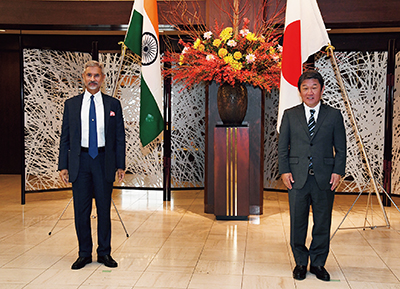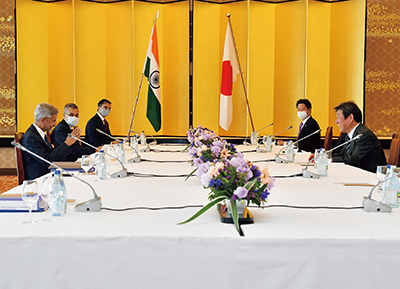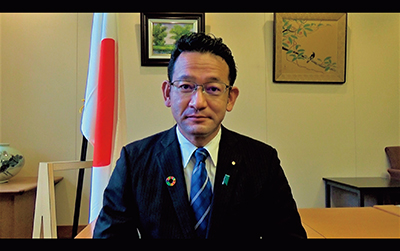Diplomatic Bluebook 2021
Chapter 2
Japan's Foreign Policy by Region
5 South Asia
(1) India
Geopolitically speaking, India is an extremely important country as it faces the Indian Ocean, which connects Asia and Africa, and is positioned in the center of sea lanes. Additionally, India has the third largest economy in Asia, with the world's second largest population and a huge middle-income group. In recent years, India has been implementing a variety of economic initiatives, including “Make in India,” and has been realizing steady economic growth. Although India's economy has significantly contracted due to the spread of COVID-19, it is aiming for an economic recovery through the promotion of its manufacturing industry with the new “Self-reliant India” campaign. In diplomatic relations, the “Act East” policy has been laid down in implementing active diplomacy to promote concrete cooperation in the Indo-Pacific region, thereby enabling India to gain more influence in the international arena as a global power.
Japan and India are the two largest democratic countries in Asia, sharing common fundamental values, such as democracy and the rule of law, as well as strategic interests, and under the “Japan-India Special Strategic and Global Partnership,” have broadly deepened cooperation in their economies, security, people-to-people exchanges, etc. The Japan-India relationship is the most promising bilateral relationship in the world, and its importance is increasing as the uncertainty of the existing international order increases. Additionally, India is an important partner in realizing a “Free and Open Indo-Pacific,” and multilateral cooperation, such as between Japan, Australia, India and the U.S., is progressing. The deepening of bilateral and multilateral cooperation between Japan, which faces the Pacific Ocean, and India, which is located in the center of the Indian Ocean, will greatly contribute to the peace and prosperity of the Indo-Pacific region. India is also an indispensable player in building the economic order in the Indo-Pacific region, and in that sense, it is expected that India will return to the RCEP Agreement in the future.
In 2020, amidst the response to COVID-19, Japan and India continuously had high-level exchanges of opinions, including Japan-India Summit telephone calls. At the summit telephone call held in September immediately after Prime Minister Suga took office, both Prime Ministers shared their view to contribute to advance the partnership between Japan and India. In October, Japan and India seized the opportunity of the Second Japan-Australia-India-U.S. Foreign Ministers' Meeting in Tokyo and held a face-to-face Japan-India Foreign Ministers' Strategic Dialogue, where they reaffirmed the importance of cooperation toward the realization of a “Free and Open Indo-Pacific,” Japan-India cooperation in third countries, such as ASEAN and Southwest Asian countries, and the steady progress on the high-speed rail project. Additionally, concrete cooperation frameworks are progressing, such as the signing of the Agreement Between the Government of Japan and the Government of the Republic of India Concerning Reciprocal Provision of Supplies and Services Between the Self-Defense Forces of Japan and the Indian Armed Forces (Japan-India ACSA) in September. India is the sixth country that Japan has signed an ACSA Agreement with, after the U.S., Australia, the UK, Canada and France. If the agreement is concluded in the future, then it is expected that not only will it promote cooperation between the Self-Defense Forces of Japan and the Indian Armed Forces on the ground, but also Japan and India will contribute even more actively to international peace and security.
In response to the spread of COVID-19, Japan is also cooperating in strengthening India's health and medical systems through the provision of emergency yen loans of 50 billion Japanese yen and grant aid of 1 billion Japanese yen for the purpose of providing medical equipment at the end of August.

 13th Japan-India Foreign Ministers' Strategic Dialogue (October 7, Tokyo)
13th Japan-India Foreign Ministers' Strategic Dialogue (October 7, Tokyo)(2) Pakistan
Pakistan is located in a strategic position connecting Asia and the Middle East. Thus, its political stability and economic development are essential for the stability and growth of the region. Pakistan is also one of the most important countries in the context of international counterterrorism measures. Furthermore, the country embraces a population of more than 200 million, and approximately 60% of the total population is under 25 years old, thus making its economic potential high. In foreign relations, the India-Pakistan relationship has remained tense since August 2019 when the Government of India decided to revoke Article 370 of the Constitution, which recognized the special status of Jammu and Kashmir. Furthermore, under the “All Weather Strategic Cooperative Partnership,” the relationship with China has been enhanced in a wide range of fields toward the construction of an economic corridor between China and Pakistan (CPEC), which is an important constituent element of China's “Belt and Road” initiative. The relationship with the U.S. remained stagnant for a period of time, with Pakistan being criticized by name in the Trump administration's new South Asia strategy, but has been improving with the cooperative relationship developed for bringing peace to Afghanistan since July 2019 when Prime Minister Imran Khan visited the U.S. and established a personal relationship with U.S. President Donald Trump. On the economic front, the growth rate in FY2018/2019 of 3.3% sharply dropped to -0.4% in FY2019/2020 due to the impact of COVID-19. The Khan administration has faced a serious shortage of foreign currency reserves since its inauguration, and it has been working on negotiations for support from its friendly countries and the implementation of IMF programs.
With regard to the relations with Japan, Federal Minister for Economic Affairs Division Muhammad Hammad Azhar visited Japan in January and met with Finance Minister Aso Taro and State Minister for Foreign Affairs Wakamiya Kenji. Following this, even under the impact of COVID-19, Foreign Minister Motegi held a telephone call with Foreign Minister Shah Mahmood Qureshi in May, and Defense Minister Kono Taro held a telephone call with Chief of Army Staff Qamar Javed Bajwa in August, maintaining and strengthening bilateral relations.
(3) Bangladesh
Bangladesh, in which Muslims account for around 90% of the population, is a democratic country located in the Bay of Bengal and is geopolitically very important as an intersection between India and ASEAN. Furthermore, with the deterioration in peace and order in Rakhine State of Myanmar since August 2017, more than 700,000 displaced persons have flooded into Bangladesh, but their return has not yet been realized. There are concerns that their prolonged displacement will put a growing burden on the host community and that local peace and order will deteriorate. On the economic front, the country maintained high growth and recorded a steady economic growth rate of around 8.13% in 2019, thanks to robust exports mainly of textile products.
Bangladesh was impacted by COVID-19 in the first half of 2020 but has been on a recovery trend since then. With a population of around 165 million people, Bangladesh has a production base with abundant low cost and high-quality labor, and the high potential of its market including considerable infrastructure demand is continuing to attract attention. The number of Japanese-affiliated companies developing business in the country has increased from 61 in 2005 to 315 in 2020. However, the securing of a stable supply of electric power as well as infrastructure improvement remain as challenges for foreign companies investing in the country.
As for relations with Japan, Prime Minister Abe held a telephone call with Prime Minister Sheikh Hasina in August, confirming cooperation to bring COVID-19 to a close and the further strengthening of bilateral relations, and additionally had a close discussion on the issue of displaced persons from Rakhine State of Myanmar. In October a donor conference was held in support of the displaced persons, co-sponsored by the U.S., EU, UK and the United Nations High Commissioner for Refugees (UNHCR). Parliamentary Vice-Minister for Foreign Affairs Kokuba Konosuke explained Japan's support for improving the environment for the return of the displaced persons in Rakhine State of Myanmar, and Japan's support for the host communities and the displaced persons in Bangladesh.
(4) Sri Lanka
Sri Lanka is located in a strategic position on the sea lanes in the Indian Ocean. The country is traditionally one of the friendliest countries to Japan and its geopolitical and economic importance is note-worthy. With regard to domestic politics, after President Gotabaya Rajapaksa was elected in the November 2019 presidential election, in the general election which was postponed to August 2020 due to the impact of COVID-19, the ruling Sri Lanka Podujana Peramuna party led by Prime Minister Mahinda Rajapaksa won with 145 seats, greatly exceeding a majority (113 seats) in parliament, and solidified the political system. On the economic front, after the end of the conflict, the economy of Sri Lanka was growing at an annual rate of 7%, and it continues to maintain steady annual growth of over 3% in recent years, with GDP per-capita recorded at 3,852 US dollars in 2019. Economic growth in 2019 was only 2.3% due to the effects of terrorist bombings that occurred that year, and in 2020 the economy was depressed due to the impacts of COVID-19, but given the geopolitical importance of the country and its access to the Indian market, an even higher growth rate is expected.
In relations with Japan, the 4th Sri Lanka-Japan Dialogue on Maritime Security, Safety and Oceanic Issues was held via teleconference in October.
 Parliamentary Vice-Minister for Foreign Affairs Kokuba attends the Donor Conference on Sustaining Support (teleconference) for responses to the displaced persons from Rakhine State of Myanmar (October 22, Tokyo)
Parliamentary Vice-Minister for Foreign Affairs Kokuba attends the Donor Conference on Sustaining Support (teleconference) for responses to the displaced persons from Rakhine State of Myanmar (October 22, Tokyo)(5) Nepal
Nepal has geopolitical importance as an inland state in South Asia between the great powers of China and India. For many years, Japan has been a major donor to Nepal and the two countries have traditionally built friendly relations through a variety of exchanges including between the imperial family and the former royal family, and through mountaineering. In domestic affairs, under the new constitution, the first federal, local and regional elections were held in 2017, and in February 2018, Prime Minister K.P. Sharma Oli was inaugurated. In the economy, particularly amidst the spread of COVID-19, Nepal is taking economic measures to reduce or exempt tariffs and corporate taxes on small and medium-sized enterprises and to create jobs for 700,000 people.
Regarding the relationship with Japan, Parliamentary Vice-Minister for Foreign Affairs Nakayama Norihiro visited Nepal in January and paid a courtesy call to President Bidhya Devi Bhandari and Prime Minister Oli. In March, a direct flight between Narita and Kathmandu went into service, and there were moves to promote people-to-people exchanges.
In June Japan also exchanged notes regarding grant aid of 300 million Japanese yen for the provision of health and medical equipment, and provided support via international organizations.
(6) Bhutan
Bhutan sets Gross National Happiness (GNH) as a guideline of the administration and is working on the priority issues of reducing poverty, improving the quality of healthcare and education, gender equality, the preservation of the environment, culture and traditions, stabilization of the macroeconomy, etc., under the 12th Five-Year Plan (from July 2018 until June 2023).
In June, Japan exchanged notes with Bhutan, where there has been a concern about the impact of COVID-19, regarding grant aid of 300 million Japanese yen for the provision of health and medical equipment, and provided support via international organizations.
(7) The Maldives
Located in a strategically important location in the Indian Ocean, the Maldives is an important partner to Japan in achieving a “Free and Open Indo-Pacific.” Economic growth in the Maldives is mainly led by fishing and tourism, which account for about 30% of GDP, and the country's per-capita GDP has reached the highest level in South Asia. However, the economy has sharply fallen since the spread of COVID-19, primarily from the shock to the tourism industry. In domestic affairs, the Solih administration was launched in November 2018. In the parliamentary election held in April 2019, the ruling Maldivian Democratic Party (MDP) captured two-thirds of the seats in parliament, thus solidifying the political footing of the administration of President Ibrahim Mohamed Solih. Since his inauguration, President Solih has been promoting a foreign policy of strengthening cooperation with every country that hopes to build mutually beneficial relations, and of advancing cooperation with other countries in the region including India.
Regarding the relationship with Japan, State Minister for Foreign Affairs Wakamiya Kenji and Minister of Foreign Affairs Abdulla Shahid held a telephone call in April and confirmed that the two countries would work in close coordination on measures against COVID-19, and such efforts are continuing to strengthen bilateral relations.
